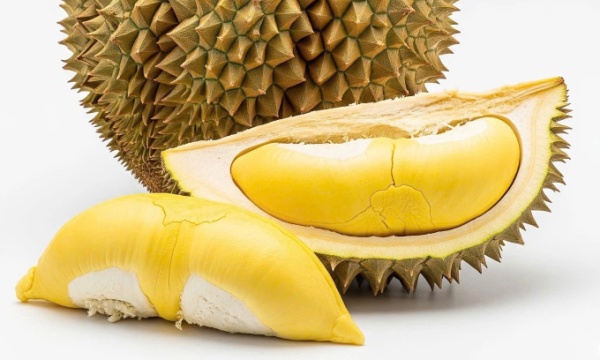
|
A durian and durian segments. Photo by Read/Trong Nghia |
Durian is calorie-dense, with 100 grams providing approximately 147 calories. It contains 27.1 grams of carbohydrates (including 19 grams of natural sugar), 1.5 grams of protein, 5.3 grams of fat, and 3.8 grams of fiber. Additionally, durian is a good source of potassium, vitamin C, vitamin B6, and antioxidants that help neutralize free radicals, support heart health, and boost the immune system.
Dr. Nguyen Anh Duy Tung from the Nutrihome Nutrition Clinic explains that diabetics do not need to completely avoid durian, but it should be consumed in moderation and balanced with other foods. Durian has a moderate glycemic index (GI), ranging from 55-65, depending on the variety. However, it can still raise blood sugar levels if eaten in excess or paired with starchy foods.
Diabetics should limit themselves to one to two small segments (about 40-60 grams) per serving and avoid eating it at night or when hungry. The best time to enjoy durian is one to two hours after a main meal, when the body’s energy levels are more stable.
Patients should avoid eating durian alongside high-starch foods like white rice, noodles, or sweets, as these combinations can cause a blood sugar spike. Instead, pairing durian with fiber-rich foods like chia seeds, vegetables, or protein sources like unsweetened yogurt or unsweetened nut milk can help slow sugar absorption.
It is important for diabetics to avoid consuming durian before or after alcohol or coffee as it can cause bloating, digestive discomfort, or even raise blood pressure due to interactions with compounds in the fruit. Since durian is high in calories and fat, consuming it frequently or in large quantities may lead to weight gain, which can worsen insulin resistance.
Monitoring blood sugar levels before and after eating durian can help track the body’s response. If blood sugar rises more than 40 mg/dL compared to pre-meal levels, portion sizes should be adjusted, or the fruit should be avoided.
Dr. Tung recommends that diabetics consult regularly with an endocrinologist or nutritionist for personalized advice on controlling blood sugar levels and developing a suitable diet plan. Natural supplements like GDL-5, derived from South American sugar pollen and containing natural policosanol, can help regulate blood lipids, control blood sugar, and prevent cardiovascular disease.